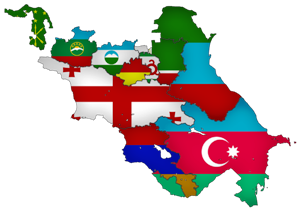 The jet plane crisis between Turkey and Russia has increased mobility in Caucasus and Central Asia. These developments, which we can say will be of disservice to Turkey in the medium and long term, force Turkey to develop new approaches to the region.
The jet plane crisis between Turkey and Russia has increased mobility in Caucasus and Central Asia. These developments, which we can say will be of disservice to Turkey in the medium and long term, force Turkey to develop new approaches to the region.
During the last months, Russia reinforced its military base in Armenia and announced the establishment of a joint air defense system with Armenia. In their statements, Russian authorities stressed that these measures were taken not against Turkey, but against the Western alliance. They further indicated that the joint air defense system was only a beginning and that it would be expanded to other members of the Commonwealth of Independent States (CIS). In other words, Turkey’s attempt to protect its airspace has prompted Russia to create a new domain. This will naturally facilitate the cooperation among countries within this domain and have an adverse effect on political formations showing affinity with Turkey and other Western countries.
In his statement, Russian Defense Minister Sergey Shoygu argued that Turkey betrayed Russia, and he lauded Armenia as one of the first to react to Turkey’s betrayal. Disturbed by the developments on the domestic political scene, the Yerevan administration appreciated the Russian military assurance and rolled up its sleeves for a new process of cooperation with the Kremlin. It took actions for partnership with Belarus, Kyrgyzstan and Tajikistan.
In addition to the military developments in Caucasus, a new energy move came from the quartet of Russia, Armenia, Iran and Georgia. In the talks held in Yerevan, the four countries signed a memorandum on energy, energy security, and advanced cooperation in this field. Georgia, too, is on the move as there will be a new energy cooperation area from Iran toward the north. While there have been heated debates in Georgia suggesting that the country should buy natural gas from Russia and Iran, not from Azerbaijan, the reaction of Baku to this new cooperation is not known. In the new period, Armenia is expected to be relieved in many respects and have major gains in cooperation with Iran and Russia.
Yerevan’s war rhetoric
A statement made by Armenia after reaffirming confidence in this process sparked concerns also about the course of events regarding the Nagorno-Karabakh issue. The Armenian Ministry of Defense stated that given the incidents along the line of contact, there is no truce with Azerbaijan and that the situation can be described as a state of war. Armenian claims that the weapons Azerbaijanis use and the deaths that occurred along the line of contact make it hard to depict the situation as a truce. Azerbaijan responded saying that Armenian soldiers were already unlawfully in the occupied territory.
Armenia will step up its war rhetoric, warming up the region. President Serzh Sarksyan’s refreshing his power with the referendum on the constitution, Russia’s pledge of support to Armenia in all areas and the increased Russian impact on the region make Yerevan sharpen its discourse against Baku.
Tbilisi’s anti-Western stance may increase
At a time when our other neighbor Georgia secured visa liberation with Europe, Russia announced that it has launched a similar application for Georgian citizens, which came as surprising to many. Georgian Prime Minister Irakli Garibashvili’s resignation in this process gave the impression that pro-Western politicians in Tbilisi are facing pressures. Given the fact that Garibashvili was working in harmony with the European Union and NATO, his resignation is indicative of new developments in the region. In the post-Saakashvili period, pro-Western politicians were removed from office or neutralized and pro-Kremlin groups came to the fore in Georgia.
Many would remember the negative comments former Prime Minister Bidzina Ivanishvili had made regarding the unfinished Baku-Tbilisi-Kars railway project. It was noted that with the Abkhazian Railway project, marketed as an alternative to this project, Georgia would fulfill the mission of connecting Armenia to Russia. Currently, the situation is not any different.
On the other hand, the Nardaran incident, the fire in the Caspian Sea and economic problems in Azerbaijan signify the start of a new process that must be monitored closely. In addition, the Kremlin is preparing to exert pressures on Baku in many areas, urging it to join the Eurasian Economic Union (EUU) in the first place. Russia’s moves in the Caucasus apparently target Turkey.
It is essential that Ankara takes measures against developments that might threaten its presence and interests in the region. Abandoning our fancy that “Russia cannot do without Turkey,” we must realize that a “Caucasus without Turkey” is in the making.
Mehmet Fatih ÖZTARSU

 Ocak 18th, 2016
Ocak 18th, 2016  oztarsu
oztarsu  Posted in
Posted in  Tags:
Tags: